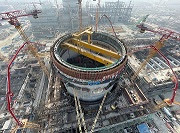Russia is constructing as well as financing 90% of the total cost for the Ruppur Nuclear Power Plant (RNPP) in Pabna, a district in northwestern Bangladesh. In late 2017, the Russian state-run nuclear energy firm Rosatom began constructing the plant, which has a price-tag of nearly US$13 billion, and is expected to complete in mid-2023.
“The work of the Rooppur Nuclear Power Plant is progressing speedily and the government has a plan to install another nuclear power plant,” Hasina announced.
While the Prime Minister said the project remained a go, geopolitical analysts and economists told BenarNews that uncertainty over its implementation has increased after nations including the United States, France, Germany, Italy, the United Kingdom and Canada penalized Russia’s central bank and excluded some Russian banks from the SWIFT system. The system is a network used by banks to allow financial transactions across the globe.
Mustafa Kamal, Bangladesh’s Finance Minister, said officials could look for alternative transaction options following the decision on SWIFT.
A currency swap could be one of the options, he said after approving a proposal to purchase 30,000 tons of potassium chloride fertilizer valued at US$17.4 million (1.5 billion taka) from Russia’s Foreign Economic Corp.
“That purchasing fertilizer from Russia was not a new thing. We will try to continue to import items from Russia,” he said, adding that if Moscow failed to deliver, the government would explore alternative sources.
A spokesman for Bangladesh’s central bank, Serajul Islam, said he expected Bangladesh to continue transactions with Russian banks not affected by the sanctions.
In addition, “Bangladesh Bank already sent a letter to the Finance Ministry to allow us to do a currency swap with the country to avoid SWIFT-related restrictions,” he told BenarNews.
After a National Economic Council meeting chaired by Hasina on Wednesday, Planning Minister Mannan said the construction of the nuclear plant would not be affected by the outbreak of the war in Ukraine because of a bilateral agreement with Moscow.
“Bangladesh is against any war. The Prime Minister has clearly said we are a peace-loving country. We want peace, not war,” Mannan told BenarNews.
“Though they are fighting, both the countries are friends of Bangladesh. Ukraine is our friend. And Russia has been our friend for a long time. We always recognize the Russian role in our Liberation War,” he said, referring to the 1971 war of independence from Pakistan that led to Bangladesh’s birth as a nation.
He made the comments the same day Bangladesh abstained from voting on a United Nations General Assembly resolution, which condemned Russia’s aggression in Ukraine and demanded that Moscow immediately withdraw its troops from its neighbor next-door. As many as 141 UN member-states voted in favor, while five voted no and 35 abstained.
Meanwhile, a Bangladeshi media consultant representing Rosatom released a statement from the company to BenarNews without elaborating.
“No disruption is foreseen in any of the commitments and work schedules in the construction of the Rooppur Nuclear Power Plant,” it stated.
A Bangladeshi who is a worker on the project said he and other employees had always been paid on time for their work in constructing the plant, but many were now concerned about whether they would still receive a steady paycheck because of the Ukraine invasion.
“Though the authorities assured us that payments would be done normally and the work environment is still normal at the project site, many workers are worried about the future,” Hasan Miazi told BenarNews.
If Russian President Vladimir Putin does not end the invasion or withdraw his forces from Ukraine soon, that could have a negative impact on the project in Bangladesh, according to a professor at Dhaka University.
“Not only Bangladesh, but countries who have financial relations or projects with Russia all will be in trouble. This crisis will come into the fore within three months if the war does not stop,” Delwar Hossain, a Professor of International Relations, told BenarNews.
“As such mega-projects must be prepared for unexpected situations, the current conflict will not hamper it if the war ends immediately,” he said.
Bangladesh could end up paying if the ongoing conflict brings an end to the construction project, another academic said.
“Uncertainty over such mega-projects creates serious problems for countries like Bangladesh. Bangladesh would be bound to repay Russia the credit given for the project,” Anu Muhammad, a Professor of Economics at Jahangirnagar University, told BenarNews.
Meanwhile, a security analyst expressed the need to move ahead cautiously.
“Any wrong move in dealing with Russia can put Bangladesh under sanctions. So Bangladesh should be alert of every global development in the Russia-Ukraine issue,” said Abdur Rashid, a retired major-general.














